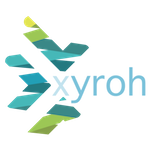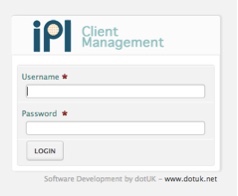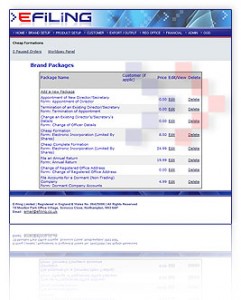IPL – Quote Management and CRM System Case Study
Prior to Xyroh, Andy was the founder of dotUK (A software development firm based out of Yarm and Stockton on Tees here in the North East), again specialising as a developer in mobile apps, web applications and desktop software for a number of business clients – this is one of those portfolio case studies
Summary
International Procurement, a Stockton on Tees (North East) based supplier of severe service isolation solutions, needed a means to better automate and streamline their already complex request, quote, supply and invoicing workflow,
Technical
Client International Procurement – Critical & Severe Service Isolation Solutions
Platforms Web, Web Services, Kashflow
Technologies PHP, CSS, JQuery, Javascript, MySQL, REST API, JSON, Kashflow, SOAP
Development Web Development, Web Services Integration, Kashflow Integration
Case Study
The IPL sales process workflow is complicated by the very precise specification and requirements attached to each and every order, often a customer enquiry for a product will be met with a variety of options from a supplier, may have to meet complex supply requirements (including lengthy import, export and trade embargos), and even build to order solutions.
With that in mind, dotUK built, upon their in-house web services framework, a cloud based software solution that runs in the web browser, and is accessible both internally, to allowed users on the road or in home working environments, and to mobile and smartphone devices over the web, bespoke to IPL’s requirements.
The summary workflow required was in essence;
• Record Enquiry
• Manage Supplier requests (with quote and attached document management) to fulfil the enquiry
• Freeform Quote Generation (Multiple Quotes and Variations)
• Quote to Order process
• Supplier Purchase Order generation to fulfil the client order
• Invoice generation, and customer management to the web based Kashflow accounts software
Where document generation was required we standardised on PDF as a consistent, non-editable output format, and the system automatically maintains copies of the last generated version (eg for quotes), and also maintains an archived history of prior versions. The system also allows for management of archived records, repeat ordering, and reporting on sales and overdue enquiries.
The Kashflow accounts software integration, also web based, through it’s own SOAP based API meant that simple requests such as pushing invoices into their accounts software moved from being a one line requirement, with traditionally a costly, time consuming and frustrating integration phase, became as simple as it should be. A custom written Kashflow module was written as an extension to our web services framework that integrated seamlessly, and allowed us to continue using the same methods for data exchange and document generation. Something that wouldn’t have been possible with traditional desktop based accountancy packages
Christmas Cards for Schools Clustered Print Generation
Prior to Xyroh, Andy was the founder of dotUK (A software development firm based out of Yarm and Stockton on Tees here in the North East), again specialising as a developer in mobile apps, web applications and desktop software for a number of business clients – this is one of those portfolio case studies
Summary
Christmas Cards for Schools based in Middlesbrough here in the North East, part of Fundraising Creations, offer Fundraising solutions for Schools, their primary product being the production of bespoke printed and customised Christmas Card packs personalised with the pupils name, class and of course their own drawing. Having been responsible for the production of in excess of 1.1 million cards in the Christmas 2013 season efficiency and scalability are high priorities
Technical
Client Christmas Cards for Schools Ltd – Middlesbrough based School Fundraising
Platforms Linux, Web, WebServices,
Technologies PHP, Perl, CSS, Jquery, MySQL, REST, ImageMagick, Apache, Clustering
Development Web Development, Web Services Integration, Synchronisation
Case Study
To understand the scale and requirements to create, print and distribute in excess of 1million Christmas Cards in a 3 month period each year it’s probably beneficial to understand the workflow required, and the stages at which dotUK have been able to build out and scale, thus adding capacity each year.
• Participating Schools are sent Artwork kits
• Kits are returned and the drawings are scanned, grouped, and filed into our Web Based storage system
• School batches are processed within our processing cluster leading to the creation of digital print ready personalised images (1 Per child)
• Print ready images are synchronised to the print partner who takes responsibility for print and distribution, feeding back status to the storage system dashboard.
Due to the system being highly seasonal dotUK have built a bespoke hosting infrastructure that offers a cost effective, but highly scalable hosting solution. Services that are required year around are separated from the seasonal processing cluster, thus offering a base line cost for the majority of the year. The processing cluster is build in such a manner, that additional processing nodes can be added at 15minute deployment windows, and will automatically join in the pool of processing power, but can be removed when surplus thus reducing hosting and running costs that are unwarranted.
To maintain maximum data integrity, control, and compliance in excess of UK Data Protection requirements, the hosting cluster and processing engine is a bespoke, privately hosted solution provided, hosted, and monitored by dotUK
Depending on the solution offered to the school the workflow may include digital samples that are offered initially to the school prior to order, but ultimately school co-ordinators enter their school order quantities online through their own access portal, which triggers the print cluster and sync services to push final orders to the print partner.
In addition to the core card generation workflow, we also generate supplementary personalised products, and fully automate other ancillary services such as billing, marketing / kit requests and the ability for parents to view online samples prior to order
Efiling – Web Based Company Formation Software
Prior to Xyroh, Andy was the founder of dotUK (A software development firm based out of Yarm and Stockton on Tees here in the North East), again specialising as a developer in mobile apps, web applications and desktop software for a number of business clients – this is one of those portfolio case studies
Summary
Efiling is an award winning online company formations software product that was originally developed by dotUK and had undertaken a number or significant revisions and expansions in the lifetime of the product
Technical
Client Efiling Ltd – Online Company Formations Software
Platforms Web, Web Services, Kashflow, XML Gateway
Technologies PHP, CSS, JQuery, Javascript, MySQL, REST API, JSON, Kashflow, SOAP, XML, Python
Development Web Development, Web Services Integration, Kashflow Integration, Companies House Integration
Case Study
The Efiling Web Based Companies House Software product was initially conceived with the core functional requirements of offering a web based medium through which instruction to the Companies House Gateway could be sent, on receipt of which the gateway would act upon those instructions. Examples of commands which could be instructed include;
- Formation of a UK Company (Eg Ltd, Plc etc)
- Add / Modify / Resign a Director
- Add / Modify / Resign a Company Secretary
- Articles of Association & Memorandum
- Change Registered Office
Version 1 of the software, developed exclusively by dotUK was utilising the Companies House Email Gateway, this protocol mean that instructions were issued by embedding commands in the email message subject and the payload (data fields, attachments etc) were embedded in properly formatted email message body. Responses from the Gateway were equally sent via email to a dedicated mailbox which was polled and monitored at the Efiling end.
Efiling is a multi tenanted system, which means the core platform is used by a near unlimited number of brand owners / companies withcompany formation needs. To function in this way data security and segregation is paramount as under no circumstances can data ‘leak’ between tenants on the system, and we built robust practices and data references into place to ensure this never happened. It also added significantly to the complexity of the system as we then had to manage website templates, company names, Companies House account details, email addresses and domains to manage, in essence near every variable in the system had to be configurable on a per tenant basis.
Billing for orders was another challenge to be managed, end user payments were taken by credit card on order, however brand owners were split between pre-pay (An account with a preloaded positive balance of funds) and credit accounts (Accounts with a preset maximum negative balance according to their credit limit), so we built a complex accounting structure that allowed for both charging models, and of course all associated reporting, statements, and invoicing required. Pricing levels (Both to Efiling, and charged by tenants to their clients) was also configurable and changeable on demand.
As the product matured additional features were added, which included expanding the standard statutory Companies House product offerings to allow tenants to offer bespoke, bundled packages, which included their own value add services (eg Company Secretarial, Mail Room services, offline products such as bound articles, hard copies of certificates etc). These were managed on a per tenant basis so significant upgrades to the tenant administration tools were made, and also to Efiling’s own system administration tools which sat above the tenants as an overview.
Soon Companies House began the process of decommissioning the email gateway service, which worked well, but was limited in terms of speed of service due to the delays faced in email delivery, and introduced a new XML based gateway. This gateway is in essence a secure web service that listens real time for commands sent direct over https (secure web traffic) and using documented (mostly!) XML documents as the payload. The benefits this service offered were that responses to instruction delivery were often available instantly, and it allowed us the option to ‘poll’ the gateway periodically for updates as opposed to wait for an email to arrive. It also increased reliability as we were communicating direct with the gateway as opposed to the round robin route email can on occasion take. dotUK were heavily involved in this transition, and the opportunity was taken to significantly improve other areas of the system such as document generation and storage.

Unfortunately it became apparent as the project progressed that some areas of the new gateway functionality were incomplete, undocumented, or not tested which meant we were frustrated in our ability to communicate progress to the client. However we took steps to optimise our time as efficiently as possible and made sure that we managed the project fully, this included taking responsibility for liaising with Companies House direct (who’s hands were tied by their own third party development team) and on occasion direct with the gateway developers themselves. Ultimately we were able to build and conclude testing of instructions in parallel with Companies House as we moved towards the deadline for switch off of the old email service. This was a regulatory deadline and was immovable.
Since then we have also been involved in other third party integrations, such as feeding bank account application into the Barclays Business accounts service (again an XML based gateway) and integration with the Kashflow web based accounts software using their SOAP based API. The advantages of using Kashflow were that it meant tenant accounting transactions were ultimately delivered direct into their accounts package, new customers automatically created, invoices and credits posted, thus automating tenant admin processes, actually reducing the amount of functionality required within the Efiling Back End, and actually adding significant value to the proposition.
For more information about Efiling, or to enquire about licensing their web based company formation software technologies please visit www.efiling.co.uk



